► CAR’s guide to the best estate cars of 2024
► Our top estate car choices that are on sale now
► Practical and spacious estates to suit all tastes
Trawling the best new cars lists for something that offers an unrivalled combination of abilities? Then you may well find your needs sated by one of the best estate cars of 2024. These eminently practical machines offer an unrivalled combination of abilities and are the multi-taskers of motordom – a Swiss-army knife for family life.
What makes estate cars so good? Well, for those of us who enjoy driving, they’re a resolute middle-finger to the inexorable rise of the SUV. Basic physics favour the lower, leaner estate over the faux-sporty SUV, and reduced fuel costs and a more socially acceptable image are added bonuses.
The best new estate cars 2024 at a glance at a glance
- The best new estate for enthusiasts: BMW 3 Series Touring – Find out more
- The best new estate with the biggest boot: Skoda Superb Estate – Find out more
- The best new family estate: Volkswagen Passat Estate – Find out more
Even the best SUVs typically doesn’t offer any more utility than a good estate, either, and the latest crop of two-wheel-drive examples aren’t really even any better in the rough. Unless you’ve a fetish for a raised ride height, an estate often simply makes more sense, and they’re often ideal if you need a new family car. The only exception is if you have a large family, as you may need to resort to one of the best seven-seater cars as estates with that many seats are few and far between.
To help making picking out your next practical wagon easier, we’ve come up with a list of the best new estate cars of 2024, derived from our myriad tests and the long-standing CAR GBU – the Good, the Bad and the Ugly data section. So, to help speed up and simplify your search for the best new estate car, read on to find out more about the top contenders in this category.
Best new estate cars in 2024
BMW 3 Series Touring
A great all-round option
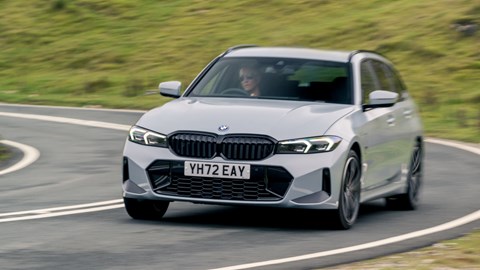
Pros: Great handling; upmarket interior and tech; competitive practicality
Cons: The obvious choice; PHEV version is accomplished but not exciting
Buyers know what they’re getting with a 3 Series Touring. It offers a combination of superb utility and top-notch driver appeal that its rivals can’t quite seem to crack – and there’s something for everybody to appreciate, with the range including all-wheel-drive xDrive variants, and petrol, diesel, and plug-in hybrid models. And, for those who must get their payload somewhere in a hurry, there’s now also the M3 Competition Touring model.
Regardless of which you go for, you get a useful 500-litre boot, backed with clever touches such as an opening rear window and unique pop-up grip rails, all of which helps make the BMW 3 Series Touring a doddle to live with. Sure, the cabin might induce a bit of a technological overload, but the controls that really matter – the steering, gearshift, brakes – all feel reassuringly analogue. We’ve come away besotted with every model we’ve driven, so you won’t go far wrong if you go for a 3 Series.
For a more in-depth look read our BMW 3 Series Touring review
Skoda Superb Estate
Stellar 660-litre boot capacity
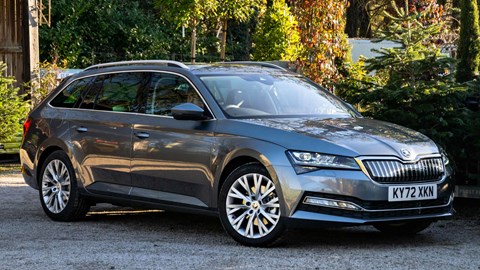
Pros: Remarkable practicality; lots of equipment; dependable and flexible
Cons: Not interesting to drive; could be more refined
People who liken cars to white goods clearly haven’t felt the satisfaction of an upmarket fridge. Yes, all it does is keep things cold – but it does it really well. There’s a sense of quality, a premium edge, and maybe one or two features you never knew you wanted. So it is with the Skoda Superb Estate; while previous generations were strictly in the Indesit category, the latest model’s more of a Miele.
Of course, it’s still staggeringly good at carrying people and their luggage, thanks to its wheelbase and a gigantic 660-litre boot. It’s also genuinely a handsome beast, and the quality-feeling interior is stuffed to the gills with what Skoda calls ‘Simply Clever’ features. A new one is just around the corner, though, which you might want to wait for. Alternatively, you could use the opportunity to get a great deal on the outgoing version.
For a more in-depth look read our Skoda Superb Estate long-term test
Peugeot 508 SW
Premium Peugeot has stacks of style
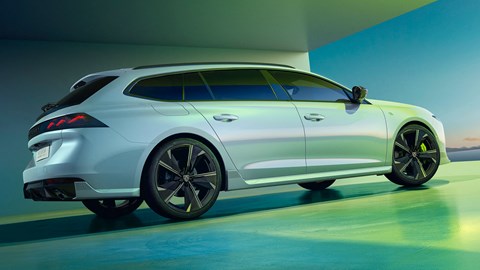
Pros: Striking looks; high-quality interior; surprisingly agile
Cons: PHEV version isn’t great; wheel/dash combo will irk some; small boot
The 508 SW – like most recent Peugeots – is an undeniable looker. Long, low, sleek, sharp-edged and genuinely alluring, it’s a world away from its dumpy predecessor. The SW here majors more on style than practicality, with rear space ranging from 487 litres to 530 litres, depending on variant. So, before leaping in, remember to check the specification sheets carefully and grab your tape measure.
The unique dashboard won’t be to everybody’s tastes either, with its small steering wheel and high-set dials. On the upside, punchy engines, ranging from an efficient 128bhp diesel up to a 355bhp plug-in hybrid, all provide decent performance, while the chassis is pliant and comfortable. A massive uptick in Peugeot quality of late also means that the cabin feels every bit as good as its German competitors, but at a usefully lower price. A facelifted version was announced this year, too, which features slightly sharper looks.
For a more in-depth look read our Peugeot 508 SW review
Audi A6 Avant
Effective and efficient premium estate
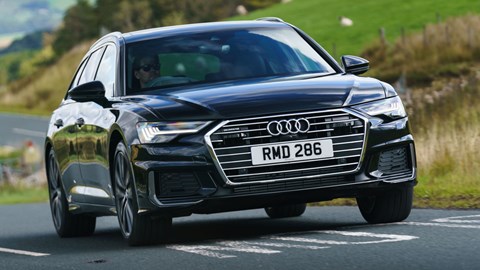
Pros: High-quality interior; slick infotainment and tech; phenomenal RS6 variant
Cons: Lesser versions aren’t rewarding to drive; ideal quattro versions can be expensive
Audi’s transformation from mid-market also-ran to premium powerhaus is on fine display in the latest A6 Avant. You can have this posh estate in a variety of formats including the blunderbuss RS6, but for daily use you can’t go far wrong with one of the entry-level petrol or diesels, the latter of which are one of the most refined compression-ignition options around.
It’s worth opting for a quattro variant if you can, though, just to improve tractability and the Audi’s on-road manner. And while the touchscreen-tastic interior won’t suit all tastes, it’s more intuitive than you might expect – and the Audi is otherwise well-built and loaded with driver-assistance tech. Throw in a competitive 565-litre boot, and bags of rear space, and this is a really versatile machine.
For a more in-depth look read our Audi A6 Avant long-term test
BMW 5 Series Touring
Long-legged luxury with driver appeal
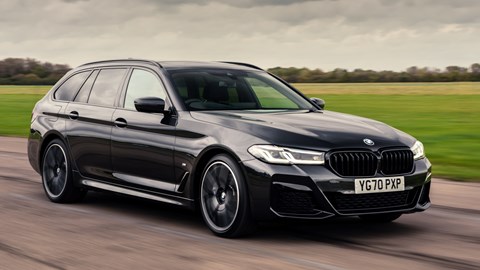
Pros: One of the best big estates out there; excellent plug-in hybrid model
Cons: Sheer size can be off-putting; boot isn’t that vast; about to be replaced
Seriously, why buy an X5 SUV when the fat-bottomed 5 Series Touring does almost everything better? Handsome by current BMW standards (even in the grille) and mighty practical, with a 570-litre boot and two-piece tailgate.
The interior’s a bit bleaker than the equivalent A6 or E-Class, but it’s intuitive and there’s no shortage of tech. Highlights include remote-control parking and semi-autonomous driving at up to 130mph – perfect for warp-speed autobahn commutes. The 520d diesel is still the default choice, serving up a more-than-adequate 187bhp, 0-62mph in 7.6 seconds and 54.3mpg. The plug-in hybrid versions are excellent, too, and well worth investigating. Whichever you go for, expect lucid steering and confident body control.
For a more in-depth look read our BMW 5 Series Hybrid review
Mercedes-Benz E-Class Estate
Upmarket Mercedes majors on refinement
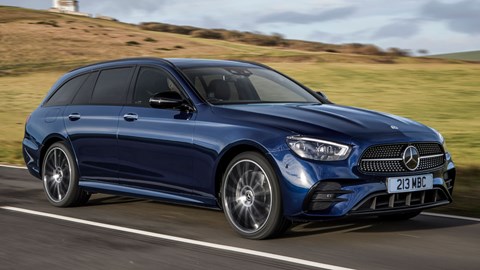
Pros: Luxurious interior; relaxing ambience; 70-mile claimed range for PHEV
Cons: Twitchy controls; sheer amount of tech can be overwhelming
Nothing says old money quite like an E-Class Estate with a Labrador in the boot. A truly classy car, it’s also a superb family holdall, with a monstrous 640-litre boot. Its hermetically sealed, ambient-lit interior is a haven from the outside world, while twin widescreen infotainment displays dominate the dash.
Unless you opt for one of the bonkers AMG models (which we highly recommend, incidentally) the E is resolutely unsporty – it cossets before it communicates. You’ve your pick of petrol and diesel variants but the hybrid options are an appealing choice, offering a claimed 70-mile range on electric power alone. Deservedly one of the best estate cars you can buy.
For a more in-depth look read our Mercedes-Benz E-Class review
Jaguar XF Sportbrake
An enjoyable and entertaining alternative
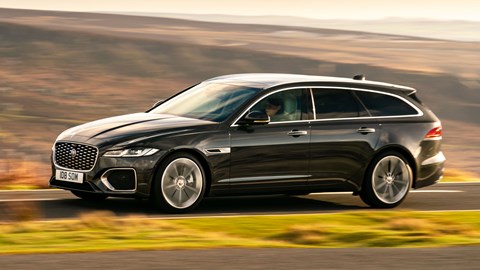
Pros: Decent blend of space and luxury; lots for drivers to enjoy; athletic feel
Cons: Not as refined as some; diesel lacks punch and refinement; getting on a bit
A recent facelift has done the Jaguar XF a world of good. It’s kept what we like – those gorgeous, Ian Callum-penned lines, a composed ride and engaging handling, and a useful 565-litre boot – while fixing a lot of the things we didn’t. So, the dreadful old dashboard’s gone, replaced with a new infotainment system and better-quality materials throughout.
The price, too, has seen a drop, to the point where an entry-level XF competes more with the BMW 3 Series than the 5 Series with which it’s more aligned on size. The diesels options are tempting but the Ingenium engines can be problematic, at least later down the line, so if you’ve long-term ownership in mind – and can stomach the costs – go for one of the petrol options. Regardless, you’ll get a car that fits Jag’s old motto of ‘grace, pace and space’ pretty darn well.
For a more in-depth look read our Jaguar XF Sportbrake long-term test
Skoda Octavia Estate
No-nonsense family hauler
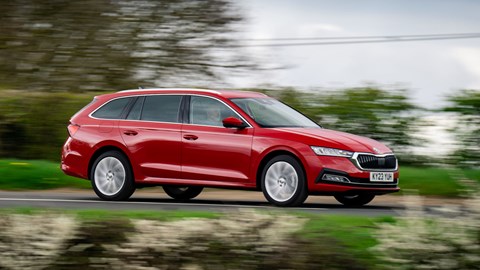
Pros: Spacious and comfortable; pleasant to drive; stacks of space
Cons: Infotainment is a bit of a faff; competitors handle better
The Octavia isn’t quite as reassuringly no-nonsense as its predecessor – there’s one too many touchscreen controls for our liking. It’s still hugely practical, comfortable and cheap to run, though. As always, the Octavia’s main selling point is that it offers the size, space and practicality of a D-segment car like a Mondeo or Insignia for the price of a Focus or Astra.
With a 640-litre boot, it’s also one of the most capacious cars on this list. Even the lowliest petrol and diesel variants are decent to drive, too – efficient and refined – and for those wanting something a bit spicier, there’s the high-performance vRS option. If you end up wanting a car that’s more engaging to drive, however, take a look at the likes of the Volkswagen Golf or Ford Focus.
For a more in-depth look read our Skoda Octavia review
Volkswagen Passat Estate
Not exciting, but terrifically competent
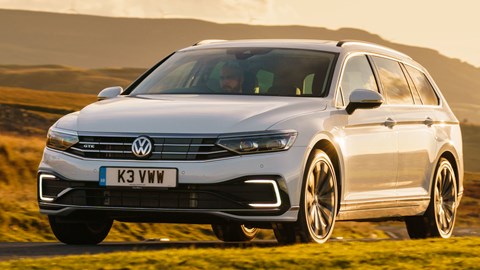
Pros: Relaxing and comfortable; plenty of storage space; lots of tech
Cons: Fine but boring driving experience; seven-speed DSG can be sluggish
In the UK market, the Passat Estate outsells its booted sibling two to one – which should give you some indication of just how good a load-lugger it is. Effortlessly straddling the line between premium rivals and more workaday options, it’s an ideal car for anyone who thinks an SUV is just too… gauche.
The massive, 650-litre boot is perfect for everything from shopping to flat-pack furniture, and there’s a good amount of high-tech kit, too – standard LEDs all round, a really intuitive infotainment system and VW’s semi-autonomous ‘Travel Assist’ that’ll work at speeds up to 130mph. You’ve also the choice of petrol, diesel and plug-in hybrid powertrains, too. So, it’s no wonder the VW Passat is one of the best family estate cars on sale today.
For a more in-depth look read our Volkswagen Passat Estate review
View Volkswagen Passat Estate lease deals VIEW OFFER
Peugeot 308 SW
Distinctive Peugeot has poise and polish
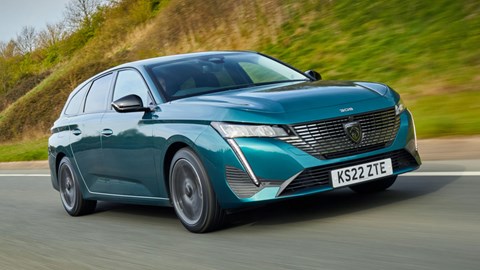
Pros: Different; good efficiency; loads of boot space
Cons: Interior can annoy; firm ride; E-308 can be hard to justify
There are plenty of solid candidates out there if you want a sensible and practical family estate, including the familiar triple-test combo of Volkswagen Golf, Ford Focus and Vauxhall Astra. But a single glance at those might leave you catatonic, which is where the Peugeot 308 SW comes in. The company’s range has changed dramatically in the past few years, and its third-gen 308, which made its debut in 2021, is dramatically different from its predecessor.
Aside from looking striking, it’s offered in petrol, diesel, electric and plug-in hybrid models, and it’s outfitted with an array of good tech. Sure, comfort isn’t a strong point, so you’ll need to try one out in person, but the high-end interior, decent boot, clever tech, interesting styling and array options makes the 308 an interesting alternative to the predictable choices.
For a more in-depth look read our Peugeot 308 review
Estate car buying guide 2024
When it comes to buying a new estate car, first think about how much space you require. That swoopy shooting brake might look the part, but a low roof and tapering tailgate will limit space for passengers and luggage. When it comes to carrying stuff, boxier is better. Boot capacity is quoted in litres and the figures here are measured up to the parcel shelf with the rear seats in place. Most manufacturers also publish a maximum figure, for loading to the roof with seats folded flat.
The next decision concerns fuel type. For a supermini-sized estate, a petrol engine is usually most cost-effective, but don’t dismiss diesel for C-segment (Focus/Golf) cars and above. Apart from the fuel economy advantage, the extra torque of a diesel helps when hauling heavy loads. Electric motors aren’t short on torque either, of course, and the number of hybrid estate cars is growing. However, many hybrids – let alone fully electric cars – aren’t well suited to towing.
If you’re still erring towards an SUV, consider that many estates are available with all-wheel drive. Further blurring the boundaries, some manufacturers offer dedicated ‘off-road’ models that combine rugged styling and added ground clearance. You may have to resort to an SUV or MPV if you have a large family, though; seven-seat estate cars are few and far between, although the recently launched and inexpensive Dacia Jogger MPV does straddle the line between estate and SUV.
Best estate cars of 2024: FAQ
What is an estate car?
An estate is a car that, as the name suggests, offers lots of interior space. Their bodies and roofs are generally longer than the comparable saloon or hatchback, which gives them more storage space behind the rear seats. Estates also employ an upwards-opening rear door, like a hatchback, which makes access to the boot quicky and easy. They may also have practicality-boosting features such as an openable rear window, allowing you to quickly load smaller objects into the boot, while dropping the rear seats will increase the size of the load bay even further. Estates are subsequently ideal for those with families or active lifestyles, thanks to their increased practicality. Estates are a good alternative to SUVs, too, as they are often more practical and better to drive.
What are the benefits of an estate car?
The major benefit of an estate car is increased practicality, compared to a conventional hatchback, coupe or saloon alternative. Estates will have larger boots, with all the seats up, allowing you to store more luggage, more easily. A Ford Focus hatchback has 375 litres of storage space with the seats up, for example, while the estate version has 575 litres to offer. A similar difference exists once you’ve dropped the seats, too. The load bays also tend to be longer, which can come in useful for those who regularly carry bigger objects. The downside is that some estates can be large, which makes them hard to park and manoeuvre.
Which estate car has the best fuel economy?
A conventional diesel estate is a good bet if you’re looking for maximum real-world economy. A Peugeot 308 SW diesel, for example, has a claimed economy figure of up to 65mpg – and that’s on the more realistic WLTP fuel economy test cycle. Don’t overlook the petrol alternatives, though; a small turbocharged petrol engine in an estate is capable of delivering good economy if driven well. Then there are the hybrid options, such as the petrol-electric Toyota Corolla Touring Sports, with a claimed 64.1mpg average economy, while plug-in hybrids offer even greater figures. At least, that is, on paper. And, of course, there are some electric estate car options, such as the MG5, which won’t consume a drop of fuel – locally speaking, that is, as the energy to power the car may well come from a non-renewable source.
Why are estate cars cheaper?
An estate car won’t be cheaper than its saloon or hatch counterpart. A BMW 3 Series saloon, for example, will set you back some £40,000. An estate version, however, commands a premium of around £2,000. It’s a similar story with cars from less upmarket brands; a Peugeot 308 hatch is just over £28,000, while the SW estate will cost approximately £1,250 more. That isn’t to say that there aren’t cheap estates, though. There are less expensive options around, though, including the Kia Ceed Sportswagon and Vauxhall Astra Sports Tourer.
Are estate cars comfortable?
That depends on which particular estate you’re looking but, as a general rule of thumb, estate cars are comfortable. They’re often designed with family life and long-distance driving in mind, so everything’s oriented at minimising driver fatigue, and the extra interior space and ease of use also helps make estate cars more comfortable overall.
Are estate cars good for towing?
There are lots of variables when it comes to picking out good tow cars but one the heavier the car, the more stable it will often be when towing. Because estates are heavier than their saloon or hatch counterparts, they will subsequently make better tow cars. Their additional room and practicality also helps make them more useful when you’re tackling a longer trip with a caravan. And, usefully, you can get many estates with all-wheel drive, which could come in handy when it comes to moving your caravan or trailer around on loose or slippery surfaces. But these are just a few of the key factors when it comes to picking a good tow car, with others including wheelbase and power, so don’t base your decision solely on weight and space.
Are there any electric or hybrid estate cars?
Electric estate cars have been relatively few and far up until recently, with the likes of the MG MG5 EV effectively having the market to itself – at least, that is, if you overlook estate-like options such as the Porsche Taycan Cross Turismo, which is one of the best electric estate cars around. More manufacturers are now offering all-electric estates, however, including Vauxhall and Peugeot. Several other electric estates are due for launch in the next year or so, too, so if none of the current options take your fancy then you might only have to wait for a little while.